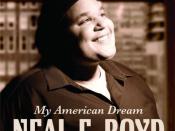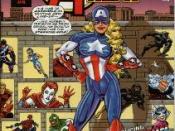The Great Gatsby , by F. Scott Fitzgerald, is a devastating analysis of the foul dust that floats in the wake of the American Dream. The ruthless pursuit of this ideal from the lowliest worker to the highest aristocrat leaves a pungent trail of ruin and corruption. The progression of the novel witnesses this path manifested in the destruction of reputation, adverse effects on the individual, social division and also the loss of moral rectitude.
Destruction of reputation is an after effect of the quest for the American Dream, constantly and consistently situations are brought to the attention of the reader where the standing and reputation of characters is traduced. Gatsby's relentless and singular goal of the dream has left him the regular topic of conversation among the inhabitants of Long Island. Prior to Nick even meeting Gatsby he is told "truths" that are absurd at best: "Well, they say he's a nephew or cousin of Kaiser Wilhelm's.
That's where all his money comes from." Despite the ridiculousness of this claim we see time and time again other rumours like it. For those who pursue the American Dream the loss of reputation is a given, from the tales surrounding Gatsby, to the whispers about Jordon Baker's sportsmanship. The nature of the American Dream is such that character assignation is part and parcel of any involvement in the wake of the ideal.
The effect on the individual of the American Dream is both profound and terrifying, characters in the novel who chase the dream have a lost sense of completion and can be said to be hollow and illusory. A prime example of this is Daisy Buchanan; having seemingly achieved the American Dream living freely and richly with few cares in the world. However, as the novel progresses we see...


